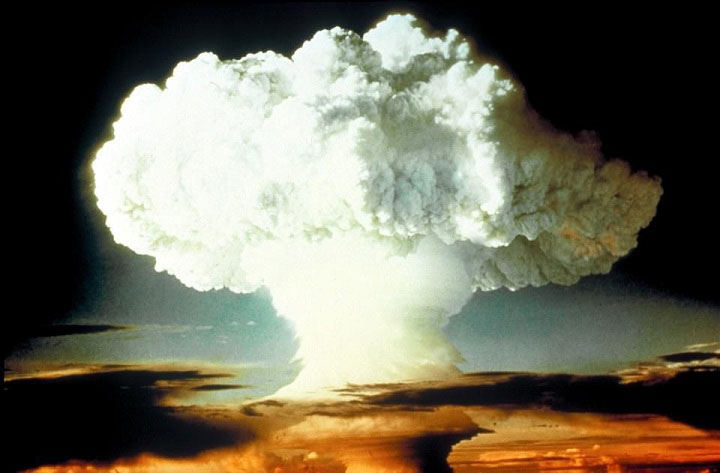The man saved the whole world from the Third World War 35 years ago
If the happenings of that 1983 stressful night were a little different, then on September 25, it was probably the day the survivors celebrated the 35th anniversary of the start of the Third World War - if so Who survived. 6 am EST time that day marks the moment of a man's choice to save the world.
On September 26 , 1983 , at midnight, the roaring alarm bell roared around Serpukhov-5's nuclear base in a secret bunker in the south of Moscow. The red screen across the office room covered by Lieutenant Colonel Stanislav Petrov did n't show up at all, now flashing a line of concern: "Start up" . From the information gathered, the computer system detected an attack, Oko, warned that the US had just launched a transcontinental missile aimed at the Soviet Union. It is estimated that missiles will hit targets within 12 minutes.
Before that warning, Petrov, shaking his hand, picked up the phone and called his superior in the Soviet Air Defense Force. He confirmed this was a false alarm . He could not find a reason for the US to only launch a single missile, perhaps with an error in the early warning system, something a software engineer like Petrov did not quite believe. When he put down the phone, the system emitted a second alarm, and then three more alarms. So there are five missiles flying in curved trajectories that are aimed directly at the Soviet Union's goal. Now the warning system is 100% sure that this is an American attack.

Petrov's hesitation helped us escape the Third World War.
"I feel insecurity rise in my heart," Petrov told a Washington Post reporter. If the attack is real, every minute is very important. Petrov's mission was to transmit a warning signal to the chain of command, to provide information to the authorities who decided to release a series of bullets in response before the US missile destroyed the Soviet counter-attack.
But he hesitated. He knew that the system had issued a warning too quickly to provide the necessary tests, he did not trust it. And until then, the ground radar system, which was supposed to be buzzing as soon as the US rocket passed through the atmosphere, was silent, the silence continued for a few minutes. when the alert is released. There is still an irrational point in the number of missiles aimed at the Soviet Union. Only 5 out of about 1000 US-owned missiles were launched, far less than what Soviet officials know. They believe that the first attack will always be overwhelming because there is no force left to survive the second wave.
The alarm bell still vibrated, warning of the attack still flickering on the screen, Lieutenant Petrov picked up the phone again to continue to confirm the false alarm with his superior. But that was when his faith was no longer certain.
Years later, in an interview with the BBC correspondent, he said: "At that time, I had a clear thought in my mind that this was really an attack on us." The waiting period of 15 minutes after that was a painful time in his heart. But in the end, nothing happened. Perhaps just a small step away, the world will embark on a nuclear war, no one but those who directly receive the chain of information from Petrov knows this fact until 1998.
Petrov was right to dismiss his belief in the computer system. These false alarms are explained by the fact that the satellite system mistakenly reflected the sun's rays from a high-flying cloud in North Dakota into light trails created by missiles. And to overcome this kind of mistake, the system has been added to the auto-collation function with a gradual view of another data collected by geostationary satellites.
At that time, Petrov, who defied all risks to save millions of lives, billions of lives, was not praised or punished at all. He was secretly transferred to another position, and retired early in 1984. A few years later, his wife died of cancer. Petrov's bold decision made him world-renowned when the story was published in 1998. But instead of taking overseas tours and participating in many interviews, he decided to live. by the end of his life in a small apartment in Moscow with a small amount of subsidies. He died in 2017.
- The saved cat lives on dog blood
- A mother gives birth from eggs saved in Hurricane Katrina
- The ice cubes save people
- The true picture changes the world and medical history 30 years ago
- Impress the natural world through photos
- The mother's promise not to abandon her comatose daughter for 38 years
- Alan Turing's work once again saved millions of people
- Mysterious US aircraft set a record of time saved space
- Why is the World Cup 4 years organized once? It is easy to think who can answer!
- The negligent mother's mother relied on
- Things to know about immunizations
- Weather makes world history
 'Fine laughs' - Scary and painful torture in ancient times
'Fine laughs' - Scary and painful torture in ancient times The sequence of numbers 142857 of the Egyptian pyramids is known as the strangest number in the world - Why?
The sequence of numbers 142857 of the Egyptian pyramids is known as the strangest number in the world - Why? History of the iron
History of the iron What is alum?
What is alum?